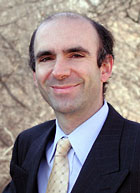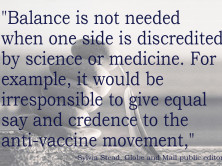
SO WHY IS HE FEEDING QUOTES TO SOURCES? Time magazine called Environmentalist and blogger, Joe Romm, pictured above, "author of Climate Progress, one of the most influential global-warming blogs on the Internet." (Image Source: TheBreakthrough.org)
One of the first rules of honest journalism is to approach a source or subject with an open mind. Sure, a journalist may have an idea of where they want their story to go, or a particular soundbite they’re looking for. But is it ethical to come right out and ask a source to give you a canned quote?
Robert Pielke, Professor of Environmental Studies, Center for Science and Technology Policy Research at the University of Colorado at Boulder writing on his blog, says no. Specifically, he criticizes a prominent blogger, physicist and climate expert, Dr. Joe Romm for trying to feed his source a quote, and then defending the act by saying that the practice “is exceedingly common,” in journalism. “I wonder which reporters Romm is referring to when he says that he has had reporters do ‘similar things,’” Pielke says. “Somehow I doubt that we’ll have any journalists admitting to such practices.” (For context, Romm has a history of atacking Pielke. Read this. And Romm isn’t just any ol’ blogger. Time magazine states his blog, Climate Progress, is “one of the most influential global-warming blogs on the Internet”).
Romm had tried to excuse himself for feeding a quote to scientist Ken Caldeira, hoping to have Caldeira criticize the chapter on climate change in a new book from Freakonomics authors Stephen Dubner and Steven Leavitt titled SuperFreakonomics. Caldeira, who was interviewed for the Superfreakonomics book, didn’t give Romm the quote he wanted, but he did forward Romm’s email to Dubner.
On October 18, on the Freakonomics blog, Dubner wrote:
The chain begins with Joseph Romm telling Caldeira that he had read SuperFreakonomics and “I want to trash them for this insanity and ignorance.” Romm adds that “my blog is read by everyone in this area, including the media” and tells Caldeira that “I’d like a quote like ‘The authors of SuperFreakonomics have utterly misrepresented my work,’ plus whatever else you want to say.”
Romm seems to have then defended himself in an update to his report about SuperFreakonomics, saying “I did ask him [Caldeira] for a quote that the Superfreaks had misrepresented his views — because I knew very well that they had based on my previous emails with him on geo-engineering. It is exceedingly common in regular journalism to ask people for a quote that makes a very specific point — I’ve been asked many times by reporters to do similar things.”
Pielke quotes two journalists responding to this excuse from Romm.
Keith Kloor a former editor at Audubon magazine writes “I’ve never done this during my career as a magazine journalist . . . feeding a source a quote is a serious breach of journalistic ethics. At NYU, where I’ve been an adjunct journalism professor, I couldn’t imagine telling a student this was acceptable behavior,” adding “I mean, it just feels wrong to do that kind of thing.”
Bud Ward, editor of the Yale Forum on Climate Change and the Media, says in a comment “I agree that it is/would be an extraordinary breach of journalistic ethics for a reporter to attempt, let alone succeed, to plant a quote, regardless of the medium of distribution — magazine, newspaper, TV, online, radio… Planting quotes is NOT journalism.”
The reason planting quotes is not journalism is that journalism is supposed to seek fairness and balance. Even if true objectivity may be impossible, it’s a journalist’s job to at least try to keep their mind open, to seek out information regardless and in spite of any preconceived notions about the subject they are reporting.
Yes journalists come to stories with an angle already in mind. But that angle should always be subject to being tested against the weight of evidence gathered. Feeding a quote to someone crosses the line between newsgathering and manipulation. Journalists should generally stick to the former.
The fact is that Caldeira actually did have some real critiques to make of the way the Freakonomics authors portrayed his position on climate change. In particular, he didn’t like a paraphrase attributing to him the statement that “carbon dioxide is not the right villain in this fight.” Romm could have used this honest critique, and needn’t have pressed Caldeira to parrot his more strenuous statement.
Romm, as a blogger, may not feel so bound by the rules of ethical journalism to avoid this. But he shouldn’t have implicated good journalists in his actions by trying to excuse his behavior as common professional practice.







Global warming is a load of crap. Its just another way for the govt to have control over the people. Anyone with half a brain who has studied geology…..read that…..geology……where records are ingrained into the EARTH and ice cores…….KNOW…….that the earth goes in cycles……long before man had put his little foot on this earth. And one of the best examples that any moron can understand is Yosemite. Remember that little valley that was cut out by glaciers LONG before man. Hmmm wonder what happened to all that ice!!!! Think there was some global warming going on wayyyyyy back when….duh before cars? Or how about Al Gores big scare back in the 60-70s when he said………we were going to freeze over! Couldn’t make any money off that one, so he had to change his tune. Oh, and lets NOT forget about the solar flares and the cycles the sun goes through. Funny how the OTHER planets were warming up also BECAUSE of them, or do you honestly think we are affecting them also. Give me a break on this global warming crap.
The first four questions that BBC reporter Roger Harrabin asked Phil Jones
http://news.bbc.co.uk/2/hi/8511670.stm started with "Do you agree that…" Those questions are no different from "I’d like a quote like…" Have you criticized Harrabin yet for his questions?